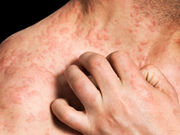Primary outcome occurred significantly more often for patients receiving dupilumab in SOLO 1, SOLO 2
MONDAY, Oct. 3, 2016 (HealthDay News) — Dupilumab is effective for patients with moderate-to-severe atopic dermatitis that is inadequately controlled by topical treatment, according to a study published online Oct. 1 in the New England Journal of Medicine. The research was published to coincide with the annual European Academy of Dermatology and Venereology Congress, held from Sept. 28 to Oct. 2 in Vienna.
Eric L. Simpson, M.D., from the Oregon Health and Science University in Portland, and colleagues conducted two randomized phase 3 trials (SOLO 1: 671 patients and SOLO 2: 708 patients) involving adults with moderate-to-severe atopic dermatitis that was inadequately controlled by topical treatment. Patients were randomized to receive subcutaneous dupilumab or placebo weekly, or dupilumab every other week alternating with placebo.
The researchers found that the primary outcome (proportion of patients who had a score of 0 or 1 on the Investigator’s Global Assessment and a reduction of two points or more on that score from baseline at week 16) occurred in 38, 37, and 10 percent of those receiving dupilumab every other week, dupilumab every week, and placebo, respectively (both P < 0.001 versus placebo), in SOLO 1. Similar results were seen in SOLO 2 (36, 36, and 8 percent, respectively; both P < 0.001 versus placebo). Dupilumab also correlated with reductions in pruritus and symptoms of anxiety or depression, and improved quality of life.
“Results from larger studies of longer duration are needed to assess the effectiveness and safety of long-term treatment with dupilumab,” the authors write.
The study was funded by Sanofi and Regeneron Pharmaceuticals, the manufacturers of dupilumab.
Copyright © 2016 HealthDay. All rights reserved.








